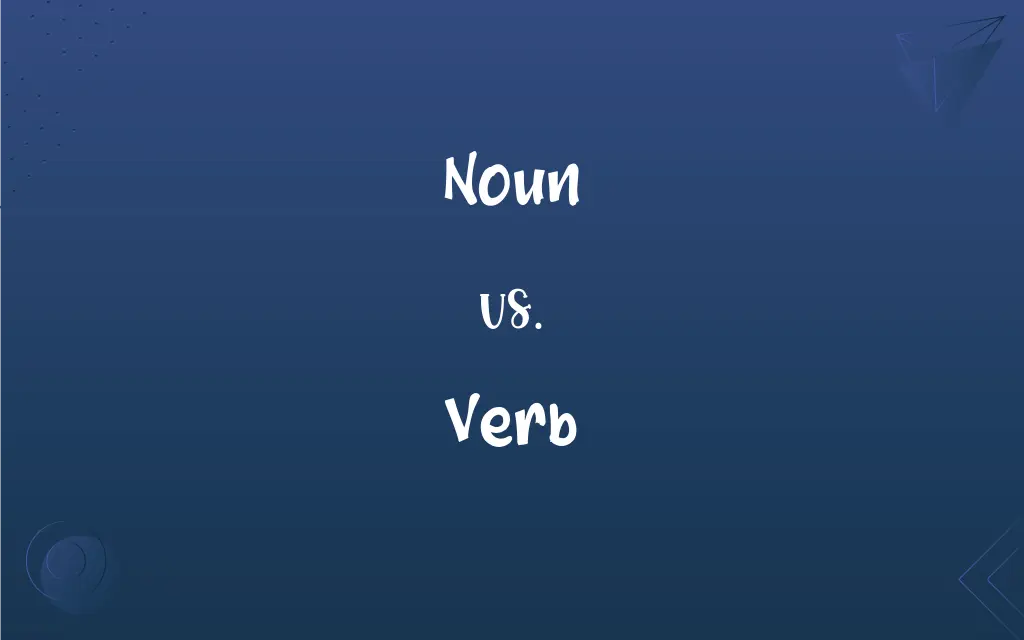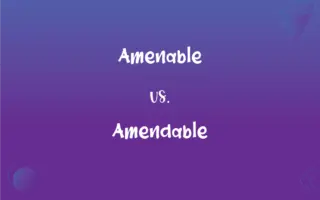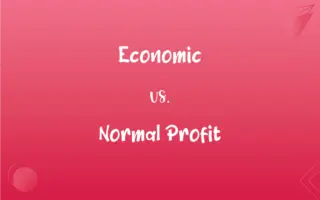Noun vs. Verb: What's the Difference?
Edited by Aimie Carlson || By Harlon Moss || Updated on October 26, 2023
A noun is a word that names a person, place, thing, or idea, while a verb is a word that describes an action, state, or occurrence.

Key Differences
Nouns are the building blocks of sentences, representing people, places, things, or ideas. Verbs are the action words in sentences, indicating what the subject is doing or being.
Nouns can be subjects, objects, or complement in a sentence, giving it substance. Verbs, on the other hand, provide the sentence with movement and direction.
In terms of grammar, nouns can be modified by adjectives and can have singular or plural forms. Verbs can be modified by adverbs and change form to indicate tense, mood, and voice.
Nouns often require an article (a, an, the) in a sentence, providing specificity. Verbs do not require articles but may need auxiliary verbs to form different tenses.
Nouns can be proper (naming specific entities) or common (general categories). Verbs can be action verbs (showing action) or linking verbs (connecting the subject to a state or condition).
ADVERTISEMENT
Comparison Chart
Function in Sentence
Names a person, place, thing, idea
Describes action, state, occurrence
Modification
By adjectives
By adverbs
Form Variations
Singular, plural
Tense, mood, voice changes
Types
Proper, common
Action, linking
Articles Requirement
Often require articles
Do not require articles
ADVERTISEMENT
Noun and Verb Definitions
Noun
A naming word in a sentence or language.
Happiness is what everyone seeks.
Verb
The part of speech that describes what the subject does.
The dog barked loudly.
Noun
A substantive part of speech.
The book on the table is mine.
Verb
The action word in a sentence.
He cooked a delicious meal.
Noun
A word that identifies a person, place, thing, or idea.
The cat slept on the mat.
Verb
A word that expresses an action, occurrence, or state of being.
She runs every morning.
Noun
A word that can function as the subject or object in a sentence.
London is a bustling city.
Verb
A term for words that convey actions or states.
Lightning struck the tree.
Noun
A linguistic term for entities, qualities, or states.
Courage is a noble trait.
Verb
A word that indicates action, occurrence, or existence.
They are happy together.
Noun
The part of speech that is used to name a person, place, thing, quality, or action and can function as the subject or object of a verb, the object of a preposition, or an appositive.
Verb
The part of speech that expresses existence, action, or occurrence in most languages.
FAQs
What is a verb?
A verb is a word that describes an action, state, or occurrence.
Can nouns and verbs have the same form?
Yes, some words can function as both nouns and verbs (e.g., "paint").
What is a noun?
A noun is a word that names a person, place, thing, or idea.
How do verbs function in sentences?
Verbs indicate what the subject is doing or being.
Are there different types of verbs?
Yes, there are action verbs, linking verbs, and helping verbs.
Can verbs express past, present, and future?
Yes, verbs change form to express different times.
Can nouns be plural?
Yes, nouns can have singular or plural forms.
Can a noun be a subject and object?
Yes, depending on its role in the sentence.
What is an action verb?
A verb that shows physical or mental action.
What is a linking verb?
A verb that connects the subject to a state or condition.
Do verbs need articles?
No, but they may require auxiliary verbs.
Are nouns always tangible?
No, they can be intangible, like feelings or concepts.
Can a sentence have multiple nouns and verbs?
Yes, depending on its complexity and structure.
Do verbs change forms?
Yes, verbs change forms to indicate tense, mood, and voice.
Do nouns need articles?
Often, especially in specific references.
What is a proper noun?
A noun that names a specific person, place, or thing.
Can nouns be abstract?
Yes, abstract nouns represent ideas or qualities.
How do nouns function in sentences?
Nouns can be subjects, objects, or complements.
Can a verb describe a state?
Yes, linking verbs describe states of being.
Are there different types of nouns?
Yes, there are proper nouns, common nouns, abstract nouns, etc.
About Author
Written by
Harlon MossHarlon is a seasoned quality moderator and accomplished content writer for Difference Wiki. An alumnus of the prestigious University of California, he earned his degree in Computer Science. Leveraging his academic background, Harlon brings a meticulous and informed perspective to his work, ensuring content accuracy and excellence.
Edited by
Aimie CarlsonAimie Carlson, holding a master's degree in English literature, is a fervent English language enthusiast. She lends her writing talents to Difference Wiki, a prominent website that specializes in comparisons, offering readers insightful analyses that both captivate and inform.































































